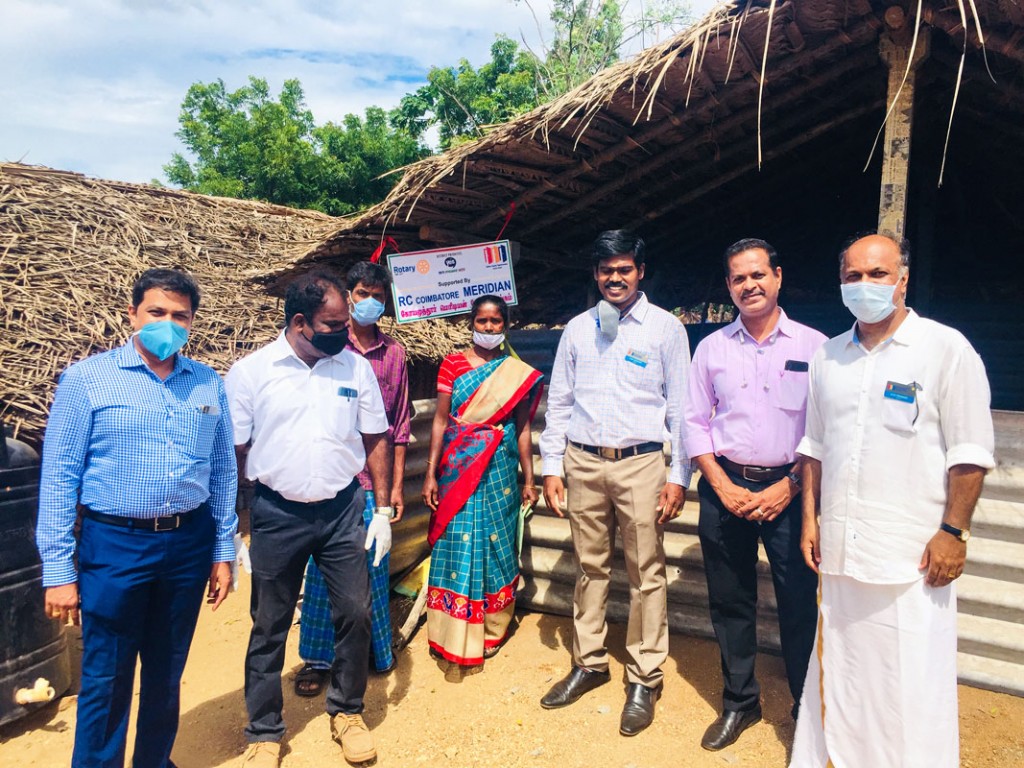Young and bubbly Sangavi from a nondescript tribal cluster near Pichanoor village in Coimbatore was crestfallen. She got admission in a reputed college, but could not get scholarship for want of government ID cards such as Aadhaar card, ration card or a voter ID. The possibility of her missing higher education was worrying her. All the 35 Malasar tribal families eke out a living at a nameless hamlet close to Pichanoor located at a walking distance from the Palakkad highway. “This village where we had constructed low-cost shelters did not have a name as it was cut-off from rest of the world and did not have power supply, or other amenities,” says
M Sathish Kumar, president, RC Coimbatore Meridian. RID 3201.

A few journalists from the Coimbatore Press Club was told about this village by the locals when they were doing Covid-relief work in Pichanoor, 12km from the city. Shocked by the pathetic conditions of tribals living in rudimentary huts, the scribes returned and started networking to build decent shelters for the villagers. “One of my media friends called me and moved by his description, I visited this place along with assistant governor C T Thiagarajan and club secretary T Loganathan in the first week of May. We were shell-shocked to find the tribals living in damaged huts with no source of livelihood,” explains Kumar.
A pilot survey
He, as incoming club president, and three of his colleagues, did a survey on the basic requirements of the tribals, listing out their immediate needs — a pucca house, toilet blocks, solar power supply (as government does not provide electricity to huts). Meawnhile, he and his friends brought to the notice of District Collector K Rajamani that these tribals do not have government ID cards. A tahilsdar was sent to take census and steps were taken to issue identity cards to these families.
This village did not have a name and did not have power supply, not to speak of other amenities.
— M Sathish Kumar,
president, RC Coimbatore Meridian, RID 3201
Following a cover story in Junior Vikatan, a Tamil magazine, 18 Rotary clubs in Coimbatore joined hands to build 21 low-cost shelters, each costing ₹12,000–14,000 on average, having a cement floor, well-thatched roof and walls made of palmyra and coconut leaves. “There is no labour cost involved as the huts were made by the villagers themselves,” says Kumar. For Sangavi, the first from her community to pass Class 12, a concrete house was built at a cost of ₹80,000 as “a token of encouragement for her to pursue higher education.” She is among the first batch of five tribals to receive government ID cards including community certificate from the district collectorate. “She is now preparing for NEET exam (medical entrance) and Rotary is providing her all help in this endeavour,” he says. He is confident that the remaining families will get ID cards within a month or so. The rest of the 14 houses were built by the Press Club and other NGOs.
Finally, a name
On July 1 during the inauguration of the new shelters by district director R S Maruthi, this long-neglected area was christened M Nanjampanoor village. “We gave 23 bicycles costing ₹1 lakh to students to pedal their way to school and a cycle stand was also installed. Once a black-topped road is laid to this village by the government, a community hall, park, playground and vegetable farmland will come up,” says Kumar. As this village is spread over six acres, Rotary clubs will be taking up tree planting drives on vacant land (four acres). A vocational centre will be set up by RC Coimbatore Midtown at the community hall to train women on tailoring for gainful employment.





